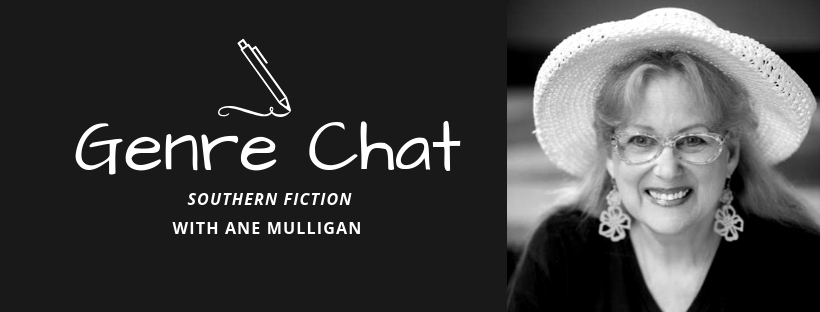
Genre Chat – Ane Mulligan – Southern Fiction
While a large, floppy straw hat is her favorite, Amazon bestselling author Ane Mulligan has worn many different ones: hairdresser, legislative affairs director (that’s a fancy name for a lobbyist), drama director, playwright, humor columnist, and bestselling novelist. She firmly believes coffee and chocolate are two of the four major food groups. Ane resides in Sugar Hill, GA, with her artist husband and a rascally Rottweiler who thinks he’s a teddy bear. You can find Ane on her website, Amazon Author page, Facebook, Twitter, Pinterest, and Google+.
Why did you choose to write Southern Fiction?
I don’t necessarily think I chose it. It sort of chose me, it’s just what I write. I live here in the South. I write about people where I live. It’s part of the romance of the South that’s a little bit different than some areas. Eva Marie Everson says, “We don’t hide our crazy relatives in the South. We put them on the front porch and celebrate them.”
What sets Southern Fiction apart from other genres?
My main way of writing is I always have an ensemble cast of strong women going through life together, warts and all. There’s usually lots of humor in what I write just because that’s how I view the world.
Where do you draw the inspiration for your stories?
Usually it’s just a basic idea. For my Chapel Springs Series, for the first book, it was an overheard conversation. It was about marriage, and what this young woman thought. I just ran with it. I thought, “If she thought that, a lot of people would too.” I just ran with it and it became a story.
What’s the difference between three dimensional characters and two dimensional characters?
Two dimensional characters are not fully developed. You’re main characters are fully developed. But two dimensional characters serve as a background like in a piece of artwork. If you don’t have that two dimensional background, the main thing doesn’t pop out. They are flat. They lack the depth. They’re only partially developed, and they’re very often stereotyped. They are vital in a novel.
What are some of the lies characters believe about themselves that drive their actions?
Amy Wallace taught me about this. She had studied psychology in collage, and that is where this came from. As a novelist, we can use it happening anywhere in their lifetime, but for most people their lies develop when they’re a small child, usually under five.
Typical lies people and characters believe about themselves:
– I’m a disappointment
– I’m not good enough
– I’m defective
– I’m too much to handle
– It’s all my fault
– I’m helpless
– I’m unwanted/unlovable
– I’m bad
Interestingly, one of my favorite ones is “I’m helpless or powerless to fix things.” That leads to a fear of being controlled, which is an interesting characteristic to give someone. This is where you can develop a lot of conflict for the story is with the lie they believe, and then it colors their hold worldview.
How do you develop the setting for your novels?
Most of mine are fictional towns. In my Chapel Springs Series, I based it on Dahlonega, Georgia and Black Mountain, North Carolina. I love the nostalgia of it; I love the smallness of it. I love that you can walk it all in a very short time. In the Southern Season book, my mayor had been asking me for ages to write a story and set it in Sugar Hill, so I finally did. And I had to take some liberties, because Sugar Hill never had a down town. It was a bedroom community that incorporated a little over 75 years ago. They have for several years been building a downtown, but for the book I had to take liberties, and just put it in an author’s note.
What does your writing process look like? Are you an organic writer or an outliner?
I’ve changed a lot, and the funny thing is I’ve gone the opposite of most. A lot of writers start out total seat-of-the-pants and discover they have to become an outliner. I was a total outliner and discovered I’m becoming more and more seat-of-the-pants. I need a plan to follow. I have to know some of the scenes. What am I going to do to get them there, and I’ll plot out about a third of the book that way, but not in a lot of detail. Then I just let the characters go, and they change all kinds of things on me.
What advice would you give to a new writer?
Enjoy your journey. It’s really rare that your first book is going to sell. I mean, that would be extremely rare. So finish it. Edit it. Move on, and just enjoy the journey that you’re on. I have made lifetime friends, deep friends. That’s part of the journey. Meeting people like you, and sharing and networking. For the Christian writer God has a time and a place. So let Him worry about that, and enjoy.
